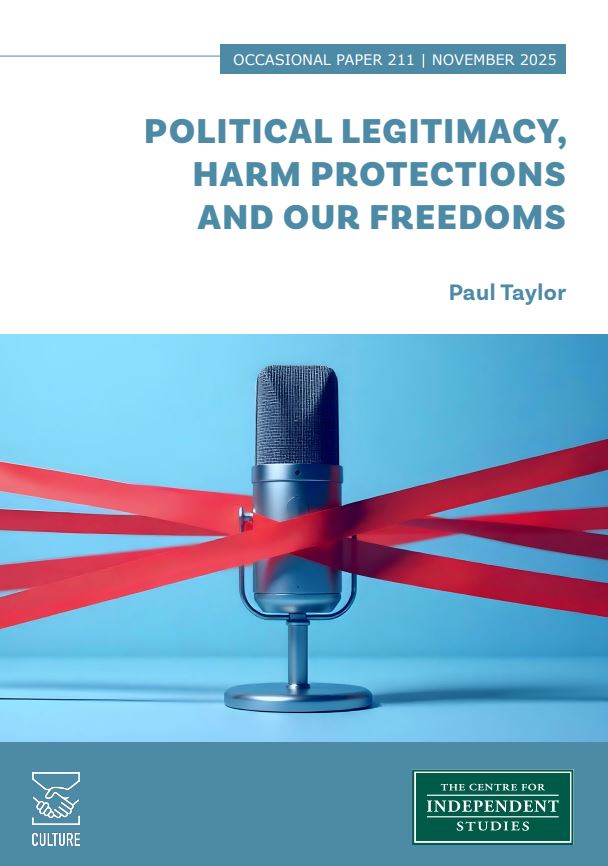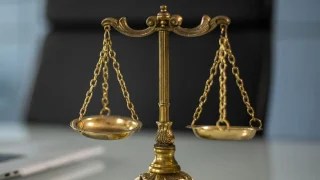
Paul Taylor is the author of a prior CIS paper, The Rule of Law, Excessive Regulation and Free Speech, which considers recent legislation on misinformation, hate speech, privacy and online safety, and related executive action, in light of the cost to the freedoms that support the rule of law and lie at the heart of a democratic society. The paper assessed how rule of law principles play their part in highlighting excessive power, and distinguishing good from bad law, including by the yardstick of basic human rights norms. The author argues the tools of accountability that support the rule of law are enhanced when human rights are properly protected, especially freedom of expression and related rights. When they are undermined, so are crucial aspects of the rule of law.
Foreword
This article considers different concepts of ‘legitimacy’ and their contribution to understanding the difference between the power to govern, and the right to do so. It discusses how the very different models of legitimacy claimed in revolutionary America and France for the governmental order then established, yield quite different outcomes in terms of the function of government, the locus and purpose of fundamental rights, and the scale of any protective role attributed to government in the ordering of society. Special attention is given to the place of fundamental human rights standards in supporting legitimacy, or challenging it.
This aspect of the role of government is of contemporary significance, since over-protective powers seem to come at the expense of individual freedoms. It is easier to understand a State’s approach where the underlying philosophical or ideological rationale is transparent, as it is in the contrasting cases of America (emphasising liberty in the hands of the individual) and France (prioritising protection against societal harm to a far greater extent).
This article examines the question of legitimacy within that framework. It also makes certain observations concerning the attitude of international law, which requires strict justification for interference with individual rights when pursing legitimate aims, whether in support of rights-holders or protecting against harms within society more broadly. It considers certain moves in Australia to expand the protective role of government, in the context of recent legislation proposed or passed that is strongly protective of Australians, or groups of Australians, against various forms of ‘harm’.
Introduction
Noam Chomsky recounted, as follows, St. Augustine’s story of a pirate captured by Alexander the Great. “The Emperor angrily demanded of [the pirate], ‘How dare you molest the seas?’ To which the pirate replied, ‘How dare you molest the whole world? Because I do it with a small boat, I am called a pirate and a thief. You, with a great navy, molest the world and are called an emperor.’ St. Augustine thought the pirate’s answer was ‘elegant and excellent’.”[1]
This prompts the inquiry, what exactly legitimises authority? It is not so much about the power to govern, as the right to do so. That question has engaged classical philosophers of antiquity, such as Plato, whose Republic envisioned a State with strong social control, censorship, and relatively little by way of freedoms (a dystopian nightmare to many), in contrast to Aristotle’s Politics, which resonates more with modern notions of the common good and the rule of law. More recently, Enlightenment luminaries such as Locke and Rousseau sought answers in social contract theory.
Both Locke and Rousseau have surviving influence which arguably reaches into contemporary law in some countries. To Locke, legitimacy is derived through the consent of the governed, in a way that contrasts with Rousseau, for whom legitimate authority was seen to rest much more on the expectation of guarantees of protection and robust social order for those governed. Important revolutionary forces in 18th century America and France drew inspiration from Locke and Rousseau respectively, producing profoundly different justifications for revolution, and also vastly different philosophical models in terms of their treatment of what became known in the 20th century as human rights. The American Declaration of Independence emphasised the individual as the rights holder, entitled to the benefits of restraint on State power (reflecting certain natural law assumptions), while the French Declaration of the Rights of Man and of the Citizen conceived of rights being yielded to the State, available in the way determined by the State, according to the “general will”, or “common [that is, collective] good”.
More recently, political theorists have postulated legitimacy by attributing importance (in different blends) to securing restraint on official power, promoting individual rights and freedoms, fulfilling democratic will, and serving the common good.
The development of the concept of legitimacy, over so great a span of years, informs — and warns against — certain present-day trends that are emerging. Those chosen for discussion in this article are characterised by the acquisition of governmental power, premised on the protective role of government against an ever-expanding range of ‘harms’. This is a phenomenon common to Australia and a number of other Western nations, as explained in my previous CIS paper, The Rule of Law, Excessive Regulation and Free Speech (the ‘companion article’.)
The companion article examined certain ‘rule of law’ issues provoked by that same phenomenon, of powerful ‘harm’ protection, and it took for purposes of illustration recent legislation concerning misinformation, privacy, hate crimes, and the exercise of censorship powers by the eSafety Commissioner. The present article is closely connected, in that it considers how some of the measures that centre upon the protection against ‘harm’ relate to questions of ‘legitimacy’, including where the result is unjustifiable impact on fundamental freedoms like the freedom of expression. As an objective benchmark of what constitutes ‘unjustifiable’ restriction on fundamental freedoms, contemporary international human rights standards are applied. Those standards themselves also have an independent role in contemporary formulations of legitimacy.
This article begins with some discussion about the contributions made by different understandings of political legitimacy, and it questions whether the concept of ‘common good’ is dependable. It then contrasts the American and French revolutions by reference to the underlying philosophy appealed to in their respective revolutionary Declarations, where it is carried into aspects of their constitutional foundations and even into contemporary law. It speculates whether the powerfully patrician control of freedoms that is seemingly in evidence in Australia (and other Western States) aligns more closely with the treatment of rights in the French model.
This article suggests that it can be important to understand the influence of modelling in legislation and other governmental action, so that the motivating forces behind it can be better understood, especially in producing human rights outcomes for better or worse. Appropriate measures for assessing those outcomes are the universal moral norms shared by States which are parties to treaties like the International Covenant on Civil and Political Rights (ICCPR) and the International Covenant on Economic Social and Cultural Rights (ICESCR). This article also considers the independent role of such international human rights standards, in informing questions of legitimacy.
The contribution made by different understandings of political legitimacy
Key criteria for determining legitimacy
In political science, legitimacy describes the circumstances giving rise to the right to rule over a society.
One particular strand, constitutionalism, stresses that legitimacy depends on observance of constitutional limitations on power.[2][3] However, the limits to such a model lie in the reality that the ‘fittingness’ of the exercise of governmental power has to be measured by broader criteria than the constitution. A constitution may not, for example, be able to address a situation where a properly constituted and once functional system of government acquires authoritarian characteristics, and for its own gain serves its own interests, for example consolidating power for its own sake, to the point that legitimacy needs to be questioned.
A useful indicator is offered by the terms ‘democratic backsliding’ and ‘democratic recession’, coined to describe a situation where government can no longer be effectively contested or constrained, because key pillars of democracy have become fractured. The most obvious symptoms of democratic backsliding are where the tools that bring accountability to those in power (such as free speech and public protest) are supressed. Another might be where election and voting systems are reconfigured for political advantage rather than to achieve better representation.[4] These symptoms of democratic backsliding hint at illegitimacy, and signal system failure, or outcome failure.
Suitable criteria need to be adopted that avoid attributing legitimacy to authoritarian regimes, which might result when focusing on the outcomes they fulfil (known as ‘output’ or ‘performance’ legitimacy),[5] or selective metrics like full employment and public order, the boast of many totalitarian States of the former Soviet Union. What they lack is legitimacy in the democratic processes (‘input legitimacy’) that are meant to produce positive outcomes. They also tend to fake public acceptance of State authority (a sign of legitimacy), when it may only have been earned by coercion or by a reward system that breeds complicity.
The choice of criteria for determining legitimacy is therefore crucial. Perhaps the most pessimistic conception of legitimacy, known as ‘pragmatic legitimacy’, rests in the resignation that certain forms of government are simply the best available, although imperfect.
This article aims to take stock of some of those aspects of legitimacy which help identify when things are not as they should be.
Is the concept of common good dependable?
Legitimacy raises expectations of serving the ‘common good’, and of benefits naturally shared by all members of the community, rather than just particular individuals or sectors, through processes that ensure fair outcomes. (This contrasts with the ‘greater good’, which focuses on the final outcome, with less emphasis on the processes involved.)[6]
Whatever the merits of different models of the common good, its pursuit is capable of being subverted by various means. A government may make exaggerated assertions concerning the benefits of certain measures to justify the cost to those who are not the direct beneficiaries, or whose rights and interests are thereby diminished. Governmental action arguably lacks legitimacy where claims to the common good merely provide pretext for restrictive laws that are sought for other purposes. Claims that legislation protects against particular ‘harms’ are increasingly common in Australia. Where the law does not pursue its declared aims, but instead is the means for achieving political advantage, or promoting an ideological cause, legitimacy may at least be questioned.
Another disruptive element capable of undermining legitimacy is elite capture, by those with private wealth, political power, or influence on a scale that can divert public resources to serve their own interests, rather than the public or common good. The influence of single or narrow interest lobby pressure, when it exceeds certain thresholds, can also significantly distort the pattern of distribution of public benefit.
One feature of modern society which inhibits the exposure of wrongdoing in government, and which has certain recognition in political science literature, is the finding that most people are “awash in ignorance” of politics.[7] Critical to informing the public is full and free access to information, and open disclosure by the government when promoting policy.
There has recently been a renewed interest in the role played by ‘the common good’ in political theory, in response to dissatisfaction at the view that it amounts to little more than what anyone says it means to them, or whatever a democratic institution determines it to be.[8]
Although Locke and Rousseau were both social contract theorists, they differ in their treatment of the common good. To Locke, the common good is achieved in the pursuit of rights and liberties for their own ends, within a system of limited government that protects those rights and liberties, provided certain rights cannot be transgressed. Rousseau’s orientation was collectivist, in which the ‘general will’ (to which the common good is directed) is met in a notion of community well-being, i.e., what is good for the community. Rousseau theorised that citizens participate in giving content to the general will, and their individual interests are subordinated to it. The function of government is to promote the general will, when necessary at the cost of the rights and liberties of the individual.
The divergence between such models is even more apparent when expressed in the principles animating the American and French revolutions.
The American and French Revolutions
American Revolution
In the early 1600s, settlement in America grew from a yearning among independently-minded religious folk in England for freedom from state-sponsored religious interference, but as the American colonies prospered it became clear that independence from British rule was compelled less by the need for religious freedom than by the financial and other burdens of allegiance imposed by the mother country. The American Declaration of Independence of 1776 was shaped by those events, in a decisive separation from what the colonies felt was untrustworthy British rule, and led to constitutional anti-State guarantees on which the American public still depends.
Parallel though different developments occurred a little later in France, leading to a revolution of an entirely different sort. The French Declaration of the Rights of Man and of the Citizen of 1789 reflects ambitions, that were achieved, for the wholesale destruction of the ancien regime (the monarchy and feudal nobility) and the establishment of a new one in its place, in which almost the opposite outcome to that in America was achieved: in France power was bestowed on the State in full trust that it would give effect to the so-called ‘general will’, for the benefit of all.
Locke was popular amongst the drafters of the American Declaration of Independence, which asserts a particular conception of natural legal rights, very much at odds with the French one: “We hold these truths to be self-evident, that all men are created equal, that they are endowed by their Creator with certain unalienable Rights, that among these are Life, Liberty and the pursuit of Happiness”. The French Declaration has no such natural law predicate.
The American Revolution had very limited ambitions, mainly to achieve an end to allegiance to Britain, and the cessation of legislative power over the 13 colonies, in the aftermath of legislation passed in Westminster that asserted the British Parliament’s authority to impose tax in America as it did in Great Britain. It was this that gave rise to the grievance of taxation without representation. The issue had become firmly one of throwing off the shackles of unjust government, based on the principle of government by consent, not irrational assertion of power.
This is where Locke comes to the fore. The second paragraph of the Declaration spells this out, after the famous proclamation that “we hold these truths to be self-evident”: “That to secure these rights, governments are instituted among men, deriving their just powers from the consent of the governed”. As it continues, Locke’s treatises are quoted almost verbatim: “That whenever any form of government becomes destructive to these ends, it is the right of the people to alter or to abolish it, and to institute new government”. This speaks to Locke’s belief in limited government, expressed in his Essays on the Law of Nature, where the government’s mission is to intervene only because of dysfunctionality in the operation of human reason.
The purpose of the American Declaration was therefore deliberately confined to protect God-given inalienable rights, resisting what the British government had done before then, by legislative incursion. The attitude of the Declaration was one of distrust towards government and towards legislation as the instrument of government most likely to restrain liberty.
French Revolution
France was ripe for revolution, perhaps spurred by events across the Atlantic. By the time of Louis XVI, the monarchy had become completely out of touch and resistant to reform. This coincided with a massive surge in population growth and a succession of poor harvests that inevitably led to huge spikes in food prices, aggravating the plight of the poorest and fomenting the conditions for violent revolution.
A new phenomenon emerged, in the power of new media (pamphlets and newspapers), to influence popular opinion on a large scale. In 1789, in the first year of what might be reckoned as a 10-year revolution culminating in Napoleon’s rise to power, the Declaration of the Rights of Man was adopted. In this, Rousseau’s contribution was prominent.
Rousseau had orientated his social contract quite differently from Locke. To Rousseau, sovereignty was seen to subsist in democracy, certainly not monarchy and aristocracy.[9] His concept of social contract bound civil society to popular sovereignty, to achieve unity. Individuals submit to this form of popular rule, and thereby forego their individual freedom, but they receive back in its place a reconstituted and repurposed freedom. At its heart was the general will, which defined principles of justice and morality and determined the norms which held society together.[10]
The State was pivotal in regulating the relationship that humans are said to establish in this way for themselves. For Rousseau, the general will was the will of each individual in their capacity as a citizen. Individuals develop a consciousness of their interests as a citizen, so the theory goes, and in turn the collective interest of the republic, by listening to their conscience. The general will concurrently reflects the rational interest of the citizen, and that of the people. The mischief with Rousseau’s form of social contract theory is that it does not prevent the State directing which norms are virtuous and which are not. Citizens transition towards conformity with the general will by a constructed process of inculcation of civic norms. The State acting through the general will is able to direct which norms are considered virtuous and which are not, even if in theory the collective will emerges from the people. The ‘general will’ represents the common good, and is the source of legitimate law and morality.
Another danger in the theory of the general will is that it tends to cement and reinforce uniformity and consensus, with the result that so-called unpopular views are less likely to be tolerated. A human rights analysis would have particular regard for the defence of those holding minority viewpoints, or practising unpopular or even despised minority religions. Symptomatic of healthy democracy is religious and political pluralism and tolerance.
At the time of the French Revolution, the radicals believed that centralised government was needed to address such challenges as internal rebellion. Its answer to civil unrest was the military draft — the first in the world — for civil purposes rather than war. Centralised, strong power in France was also seen to be the answer to economic issues, to require intervention in the free market by price controls in the service of the broader national interest, and by punishing those who stockpiled grain and other staples. It appears to represent a translation of philosophy into policy that is strongly interventionist, mandating firm State control, and a sense of submission of personal liberties, of the people, to collective public interest.
The ideals of Rousseau express great trust in a particular model of society, but they do not inexorably lead to violent overthrow of the sort that occurred in France. It may therefore be asked to what extent Rousseau inspired the French Declaration, or did the drafters of the French Declaration, and those who pursued revolution, draw on Rousseau as the peruque-wigged philosopher of huge influence from an earlier generation, to dignify and supply legitimacy for their actions.
It might well be assumed that the French Declaration is merely a historic artefact without contemporary legal status, but this would be wrong. It was adopted by the National Constituent Assembly, which assumed de facto rule after the storming of the Bastille. It has been revived in the constitution, including in the constitutions of the Fourth French Republic (of 1946) and Fifth Republic (of 1958) and remains in place constitutionally today.
Article 3 states the locus of authority very clearly: “the principle of all sovereignty resides essentially in the nation”. As far as liberties are concerned the concept of ‘harm’ has strong restraining potential in the enjoyment of liberties. For example, in article 4, “Liberty consists in the freedom to do everything which injures no one else; hence the exercise of the natural rights of each man has no limits except those which assure to the other members of the society the enjoyment of the same rights”.
In article 5, “Law can only prohibit such actions as are hurtful to society.” That gives the State the responsibility of preventing harm, foremost, and defining what harm is.
Also, in article 11, “The free communication of ideas and opinions is one of the most precious of the rights of man. Every citizen may, accordingly, speak, write, and print with freedom, but shall be responsible for such abuses of this freedom as shall be defined by law”.
Rights within the French model do not appear to exist on the basis of the inherent dignity of man (unlike the American Declaration), or any similar idea, but seem to be the product of man-made social morals. Rights do not exist for the individual’s creativity or enjoyment, but are held by units of society according to a particular notion of citizenship. Their mission is to contribute to and become subject to whatever normatively may be described as the ‘common will’. The individual, and the rights of the individual are perceived according to this social construct, in a servient role to the state.
Some key contrasts with the American Declaration will be obvious at this point. The greater trust in the State in the French Declaration, compared with the American distrust of the State. In France, individual liberties may more readily be restricted in order to prevent harm to others. It is not a matter of direct State control, except that defining and enforcing those restrictions is a prominent function of the law, to bring about a particular social order. This contrasts with the American demand that the State keep its hands off individual liberties. The purpose of individual liberties in France is to serve the general will; in America the fundamental assumption that liberties are God-given gifts for the enjoyment by the individual.
As a historical note, ‘left’ and ‘right’ terminology originated during the French Revolution, as a result of the seating pattern in the French National Assembly. Those who supported the revolution in opposition to the monarchy and old order sat on the left, while those whose sympathy lay with existing institutions sat on the right.
Key facets of contemporary American and French law
The following summarises some of the divergences between the domestic laws of America and France which reflect the philosophical attitudes already mentioned.
America
America’s history produced a very specific outcome, as already noted, in the form of deep-seated distrust of the State, and resistance to legislative incursion on individual freedoms, seen as natural rights. The First Amendment free speech right, even though not absolute, represents perhaps the most generous formulation of freedom of expression anywhere in the world.
Free speech regulation is exceptional, the main category of exception being where it poses ‘imminent danger’. However, the First Amendment also regulates other forms of speech (as in most jurisdictions), including where it constitutes defamation, obscenity, or child pornography.
France
In France, in contrast to the situation in the US, hate speech is restricted by the State much more liberally, including to protect public figures from criticism. In the US, free criticism is allowed of state officials in holding them democratically accountable, but the law in France is highly protective, going so far as to criminalise “offence to the President of the Republic”, “defamation and insult against courts, tribunals, armies”, “defamation of a minister related to their public function”, “members of the parliament, public officials, agents of public authority”. The denial of crimes against humanity is also a criminal offence.
In France, the State also undertakes the task of intervening against ‘false information’ on digital platforms in support of public order, and on a similar basis, ‘false information’ by broadcasters may result in termination of their rights, though in neither case is this directly in support of the dignity rights of the individual, but other broader public or societal interests. France also protects against fake news online, especially content influenced by foreign States.
As with freedom of expression, so with freedom of religion. In France a Burka ban, backed by sanctions, has been in place since around 2010. In the US any official restriction of religious garb would only be permitted in the most extreme cases, such as for national security reasons.
A picture therefore emerges of France at one extreme, where the State can and does intervene rigorously against free-speech, based on a strong presumption of the potential harm of speech to individual and public interests. At the other extreme in the US, a high degree of self-autonomy and freedom of expression is supported by law.[11]
International law standards are instructive but not determinative of legitimacy
How does legitimacy connect with international law
A question that arises at this point is how do principles of legitimacy, and the outcomes of different models of legitimacy claimed for example in America and France, interface with international law standards.
The answer is that compliance with international human rights standards is at the very least a factor in the optics of legitimacy. By ratifying treaties like the ICCPR, a State can add to its perception of legitimacy, and it can have positive political consequences. On the other hand, if a State, or a government as the functioning apparatus of the State, cannot commit to upholding fundamental human rights, or if it repeatedly fails to comply with human rights standards, then its legitimacy claims could be put in issue. However, political theory does not itself provide the basis of challenge.
Treaty mechanisms can. Of special importance is the ICCPR. The legitimacy that may be claimed for the ICCPR differs from the legitimacy which supports the right of political institutions to their authority. ‘Legitimacy’ for what the ICCPR demands stems from it being founded on universal moral norms, and having won ratification on a global scale, with corresponding integration in the national systems of most countries of the world. The monitoring body for the ICCPR is the UN Human Rights Committee, and cases can be brought to it by individuals claiming violation of any individual ICCPR right, provided the State in question has signed up to that procedure (as Australia has). Each State which has ratified the ICCPR is also automatically subject to a process of periodic review during which its compliance is closely examined. The obligations set out in the ICCPR are clear and binding. The ICCPR is agnostic about the styles or constitutional structures of government through which these obligations are implemented. There is therefore ample opportunity for shortcomings to be brought to the attention of the Committee, and the public.
The ICCPR establishes a scheme of rights guarantees with certain features that invite a crude comparison with certain principles espoused by Locke and Rousseau, for example, in the locus of rights, and the role of the State in the protection against ‘harms’. It can be positioned by approximate analogy somewhere between the American and French models, on the following basis.
The ICCPR does not express allegiance to any particular theoretical model,[12] though the ICCPR’s emphasis on individual rights and freedoms resonates with basic liberal principles. The intended beneficiaries of the ICCPR are individuals (though they can exercise their rights through entities) whose rights are to be enjoyed as they please, in principle for their own chosen ends. Rights are not conferred by the State, but are recognised as pre-existing. The recognition given in the ICCPR’s Preamble “that these rights derive from the inherent dignity of the human person” may be taken to reflect certain natural rights assumptions. It establishes as the basis for commitments on a universal scale the foundational principle that all human rights belong to everyone on equal terms. This principle is put more elegantly in the 1945 Charter of the United Nations (establishing the UN) in terms of “the equal and inalienable rights of all members of the human family”.
The ICCPR itself contributes to the functioning of democratic institutions, and the legitimacy of government, by means of particular democratic rights (in article 25, concerned with the right to vote and stand for parliament, and participate in public affairs — directly or through freely chosen representatives), and by the individual freedoms of expression, assembly and association. These elements help ensure government accountability, and also reflect a particular concept of a ‘democratic society’ in the justifications required whenever restrictions are imposed on these freedoms.
The ICCPR is an effective instrument in identifying where corrective influence is needed both against excessive restriction of rights, and failure to uphold rights in law. This is especially important in measuring adherence to international human rights norms. Australia ratified the ICCPR (and thereby became bound by its terms) in 1980. It is a serious matter whenever ICCPR rights are not upheld in Australian law, or where legislation is responsible for unjustifiably restricting rights. A phenomenon discussed in the companion ‘rule of law’ article concerns the excessive restriction of certain ICCPR rights as government pursues the ostensible aim of protecting individuals against harm. Legislation claims to protect against threats to a range of fundamental rights, often at great cost to other rights, in a way that does not conform with ICCPR standards.
Recent expansion of governmental power protecting against ‘harm’
In the past 12 months legislation has been proposed by the government and passed that is strongly protective of Australians, or groups of Australians, against various forms of ‘harm’. Often the harm is couched in terms of a negative impact on particular rights (for example, requiring action against the discriminatory or marginalising effect of ‘hate speech’, or the damaging consequences of an invasion of privacy). The extent of such harm is said to justify restricting other fundamental rights (such as freedom of expression).
In many instances the degree of justification is lacking, compared to what the ICCPR demands, for example when restricting the freedom of expression. The risks of this occurring are heightened when any one party commands a majority, or can depend on support for their measures, in both houses of parliament. The sheer complexity of such legislation is also a hazard, where the pitfalls are not self-evident, and parliamentary time for proper consideration is stretched. These issues were explored in the companion article, which took stock of recent legislation on misinformation, privacy, hate crimes, and the exercise of censorship powers by the eSafety Commissioner.
Occasionally there may be constitutional law grounds for challenging the legislation. One such ground might be the implied freedom of political communication, recognised as a constitutional brake on legislative power.[13] The Commonwealth hate speech legislation passed in 2024 widened the range of hate speech offences in the Criminal Code,[14] but removed a long-established defence which was there to protect a person who (among other things) “points out in good faith errors or defects in [government, legislation or the administration of justice], with a view to reforming those errors or defects”. When introducing this change the government did not cavil at the criticism that the hate speech prohibitions could reach to such a low threshold as to catch what appears to be harmless political speech.
Criminal hate speech measures are needed to combat atrocious acts of racial or religious hate speech. However, serious design flaws afflict the legislation, not least in the uncertainty of terminology around ‘violence’ which, according to the eSafety Commissioner’s official understanding includes non-physical violence or abuse because of biased or harmful beliefs.[15] It remains to be seen whether the 2024 hate crimes changes will face a constitutional law challenge for infringing on the implied freedom of political communication. It was pointed out in the companion article that changes in 2024 to the Online Safety Act, establishing a minimum age for social media use and corresponding age restrictions by social media platforms, could enable a constitutional law challenge because of the mismatch between the stated purpose of the legislation (in protecting against various harms) and the operation of the legislation.
Similar criticisms could be made of recent Commonwealth reforms to privacy law, particularly on the question of whether there is sufficient rational connection between the legislation and its stated purpose, and whether obvious and compelling alternative measures could achieve the purpose with a less restrictive effect.
At the end of the day, the practical value of asserting a lack of legitimacy is remote. It would have to rise to an extremely high threshold, and would only apply in very limited circumstances. Such a claim could be expressed by public disobedience, protests, and similar. Public outrage can be triggered by a lack of transparency, or measures which limit accountability for government or obstruct the exposure of corruption, or which are excessively restrictive of fundamental freedoms. (The Freedom of Information Amendment Bill 2025, introduced on 3 September, would make it harder to access government information. In Senate inquiry submissions it encountered little support outside the government but ‘unanimous damning assessments’.)[16] However, the public response would have to indicate overwhelmingly that a government’s right to rule was no longer supported by consent and shared principles. Lack of legitimacy might also be asserted by parliamentary process in a vote of no confidence in a government’s authority to govern, testing legitimacy directly, according to whether the government still holds the necessary support to continue in office. If such a vote is passed, it would technically only indicate loss of support of the House, but would signal more broadly a loss of public trust. A vote of no confidence has not yet succeeded in Australia at federal level. In some circumstances a loss of confidence in a government can occur where key legislation is defeated.
The recent legislation discussed above, and in the companion article, may be seen as a suite of measures that are strongly committed to the enlargement of powers in the cause of protecting against various forms of societal ‘harm’. It certainly has not resulted in such a public protest. It is relevant to the present discussion because the phenomenon of over-protective legislation aligns in certain respects with the ‘general good’ as it features in the French Declaration and the French Constitution, in contrast to the solid protection that exists in the American Declaration for individual freedoms, and in the US Constitution for free speech. The two differing social contract models which theoretically lent legitimacy to historic events in each of those countries, when the right to rule needed to be asserted, may have a historical setting but they also reflect two distinct styles of government which survive today.
Digital ID
When the companion article commented on recent social media minimum-age changes, it made only passing reference to the fact that some had expressed concern that it may presage the normalisation of digital ID for everyday access to ordinary facilities. Since that article was published, digital ID has become a volatile political issue in the UK, on the announcement by Prime Minister Keir Starmer, when addressing the Global Progress Action Summit on 26 September, that digital ID will be “mandatory by the end of this Parliament”. It was presented as the solution to public concern in the UK at the level of illegal migration into Britain. Severe hostility against the idea was expressed almost immediately by those in groups ordinarily divided by politics, and a petition opposing the idea attracted close to a reported three million signatures within three weeks.[17]
The issue which it raises is how much is Britain, and indeed Australia, driven by outside influences, in the case of digital ID, by the World Economic Forum (WEF). WEF is known to have operative influence on Australia’s eSafety Commissioner, Julie Inman-Grant, to justify extreme forms of regulation in the online space (the earlier article mentioned certain alarming comments she made at a WEF event in 2022, that, “I think we’re going to have to think about a recalibration of a whole range of human rights that are playing out online”, including freedom of speech.)[18] On the phenomenon of the WEF’s extensive influence on digital ID, and the external push for digital ID in particular, George Christiansen, who served four terms in the federal lower House, recently commented that “nobody stopped me in the street, wrote me a letter, sent an email, walked into my office, did anything to indicate to me that they wanted a digital ID system in Australia”.[19] Digital ID is a long-standing, key WEF initiative, embedded in the goal of ensuring legal identity for all by 2030 (formalised in Target 16.9) within Agenda 2023, which Australia has adopted. The issue is not whether respectable pretext can be advanced for digital ID but whether its far-reaching consequences can be effectively managed, for so long as there is the willpower to do so, and most importantly whether the design task should be entrusted to the WEF.
WEF attendance by governmental officials at Davos is controversial, primarily due to concerns that the WEF is disconnected from the real-world, and tends to foster corporate or elitist interests, with the appearance of an exclusive gathering for the powerful. This impression is not displaced when certain views espoused by regular contributors and speakers at WEF events are, to some, nothing short of spine-chilling in their predictions. For example, Yuval Noah Harari, former advisor to Klaus Schwab, has talked about the future of digital IDs, biometric data, and implants from his transhumanist perspective. If bodies themselves become instrumented, then the boundary of personal autonomy is altered. He describes how control of data might enable human elites to do something even more radical than just build digital dictatorships. By hacking organisms, elites may gain the power to re‑engineer the future of life itself.[20]
If that seems far-fetched, in China the existing digital ID surveillance system holds the genetic code of the individuals, among photographs and other material which is used to establish their social credit score, with serious outcomes.[21]
Services that are facilitated by having a digital ID include the familiar (e.g., banking (enabling financial transactions), health (providing convenient access to test results, x-rays, scans); governmental such as tax management, and access to benefits), but would in future include less familiar items like food and sustainability data from farmers and consumers (to verify the provenance of produce to advance value and traceability); travel and mobility (including border control between countries or regions).
However, the element of compulsion in the proposed UK digital ID scheme changes everything. Non-compliance deprives the individual of the right to work. Whenever any aspect of a digital ID scheme is compulsory, no matter how familiar or convenient it may have become on a voluntary basis, in one simple step it transforms it, instantly, and utterly.
It is an issue right at the heart of the difference between the American Independence idea of a society based on restraint on State power (reflecting certain natural law assumptions), and the conception in France of rights being yielded to the State, available in the way determined by the State, according to its conception of the collective good.
Conclusion
The ‘rule of law’ discussed in the companion article, and the principle of ‘legitimacy’ discussed in this article, both operate at a high level of abstraction, compared with the force of domestic law in any jurisdiction. The principal concern of the rule of law is that everyone is bound by and must abide by the law, and be held accountable for transgressing it. Legitimacy, by contrast, is about the right to rule, which turns in part on the perceived right and moral authority of a government to rule.
Legitimacy and the rule of law are related, in that where the rule of law is upheld by a State it can contribute to the foundations of legitimacy. However, upholding the rule of law does not automatically guarantee legitimacy, which depends also on public trust and moral authority.
Neither concept is directive, nor compels the substance of law in any direct sense. However, both provide indicators that corrective action may be needed in certain circumstances. They act as ‘dig here’ signs that something is amiss. In the case of the rule of law this might be where a government enacts law that is constitutionally invalid (placing itself above the law), or where the mechanisms of accountability intended to ensure power is not exceeded or abused are shorn of their effectiveness. Legitimacy, on the other hand, may be questioned, for example, where there is overwhelming lack of support for governmental rule, or where a government fails to meet basic expectations in crucial matters, including upholding democratic rights, fundamental freedoms, or principles of fairness and transparency.
There is, therefore, obvious overlap between the rule of law and the concept of legitimacy. Common to both is the place of universally recognised norms of international human rights law, establishing an objective measure of globally accepted expectations with concrete intention and substance, to ensure that the tools of accountability are maintained throughout society, by supporting the individual’s freedom of expression, the right to protest collectively (through assembly), and other freedoms which give a democratic society its essential character. The rule of law and concept of legitimacy offer interesting lenses through which to examine certain political choices, particularly those which disable these very tools. The examples of recent legislation which has such a disabling effect (considered in the companion rule of law article) are salutary. The issues concerning digital ID are profound, and are triggered by the element of compulsion, and by the degree of control it puts at official disposal. They tend to the conclusion that the Australian Government is following a model favouring powerful regulation and control rather than restraint.
This article considered different theoretical approaches to legitimacy, including social contract theory which provided sufficiently different drivers to set America and France on enduring divergent paths. Neither the French nor American models lead inexorably to particular political outcomes. However, the contrast between them reveals a greater propensity in the French model to justify restrictions on fundamental freedoms, within a constitutionally defined protective role of the State. The American model, founded in a historical mistrust of the State, and in a different purposing of fundamental freedoms, might be said to be more enabling of the tools of accountability and effective democracy.
While not established for the purpose of determining legitimacy, the ICCPR and other international human rights norms provide one basis (among others) for assessing whether government is worthy to rule. If a State has bound itself by treaty to guarantee certain freedoms in its law, there is a rule of law issue if it persistently or materially fails to adhere to those standards. There may be no consequences as a matter of Australian law for such failure. Perceptions of legitimacy may also be dented, especially since the ICCPR is particularly potent in identifying when its standards are not met. Quite independently of any question of legitimacy the ICCPR offers a concrete basis on which to call governments out, including the Australian Government, where they themselves bear responsibility.
Endnotes
[1] Chomsky, N. (2002). Pirates and Emperors, Old and New. South End Press, quoting Augustine of Hippo, De civitate Dei contra paganos, early 5th century AD (Book IV), ‘How Like Kingdoms Without Justice are to Robberies’.
[2] Phelps, M.E. (2014). ‘Doppelgangers of the State: Private Security and Transferable Legitimacy’, Politics & Policy. 42 (6): 824–849.
[3] Constitutionalism is closely connected with the rule of law, by which everyone, including those wielding governmental authority, are subject to and accountable under the law. The consequence of action in non-compliance with the Constitution may be invalidity or legal challenge, determined by court review. Such a legal response is a function of constitutional law, and is unusual because political theory does not normally receive concrete support from the law of the land.
[4] Vigilance needs to be maintained of laws that can have asymmetrical effect. The 2024 South Australian electoral laws constrain election/political donations in a way that is controversial for favouring incumbents, and the treatment of third-party campaigners. See Anne Twomey, ‘South Australia’s plan to ban political donations raises big risks as well as benefits’, The Conversation, 18 June 2025: https://theconversation.com/south-australias-plan-to-ban-political-donations-raises-big-risks-as-well-as-benefits-232383.
[5] On ‘input-oriented’ and ‘output-oriented’ legitimacy see Mazepus, H. (2016), ‘What Makes Political Authority Legitimate? An Analysis of Ideas about Legitimacy in The Netherlands, France, Poland, Ukraine, Russia, and China’. The European Consortium For Political Research.
[6] As to how the common good relates to the community, there are two main approaches, one communal the other distributive. The emphasis of the communal approach is shared participation and belonging among citizens, but this does not prevent benefits being unequally distributed across the community. See e.g. Rawls, J. (1971). A Theory of Justice. Harvard University Press, revised edition 1999 pp 82–83. The distributive approach, by contrast, stresses the theoretically fair allocation of benefits among individuals.
[7] Kinder, D.R. (1998). ‘Opinion and action in the realm of politics’, in Gilbert D.T., Fiske S.T. & Lindzey G. (eds), The handbook of social psychology. New York: McGraw‐Hill. It enables issues and events to be framed to powerful effect. ‘Issue frames’ or ‘emphasis frames’ present a particular interpretation, promoting a hand-picked selection of considerations and obscuring – or at least downplaying – others. It need not be as dexterous as parlour magic, or deploy such deliberate misdirection or diverted attention, yet it can be extremely effective. As explained by Andreas Dur, “the emphasis put on specific issue frames may change the relative weights of the evaluations, by making one or several evaluations more accessible and applicable to an issue. The result is a change in overall attitude. A framing effect hence implies that ‘a speaker’s emphasis on a subset of potentially relevant considerations causes individuals to focus on these considerations when constructing their opinions’.”
[8] Foran, M. (2023), ‘Rights, Common Good, and the Separation of Powers’. Mod Law Rev., 86: 599-628, at 600.
[9] The Social Contract of 1762.
[10] For detailed coverage of the divergences between the French and American revolutions, and their contemporary laws see Tourkochoriti, I. (2016). ‘Speech, Privacy and Dignity in France and in the U.S.A’, Loy. L.A. Int’l & Comp. L. Rev., 101; Tourkochoriti, I. (2021). Freedom of Expression. Cambridge University Press.
[11] For fine detail see Tourkochoriti, I. (2021).
[12] For the interconnection between the Universal Declaration and an Enlightenment-informed understanding of human rights, see Morsink, J. (2009). Inherent Human Rights Philosophical Roots of the Universal Declaration. University Of Pennsylvania Press. Also of interest is Morsink, J. (1984), ‘The Philosophy of the Universal Declaration’, Human Rights Quarterly Vol. 6, No. 3 (1984), pp. 309-334.
[13] The implied freedom allows Australians “to exercise a free and informed choice as electors” (Lange v Australian Broadcasting Corporation (1997) 189 CLR 520, 570). Though it can cover a potentially wide range of different forms of expression, it has relatively limited application as a freedom. Legislation cannot unduly restrict the free flow of information and discussion about government and political matters, which is considered essential for a functioning representative democracy.
[14] The Criminal Code Amendment (Hate Crimes) Act 2024.
[15] https://www.esafety.gov.au/key-topics/gendered-violence.
[16] Financial Review Opinion, ‘Labor must drop flawed and friendless freedom of information bill’, 7 October 2025.
[17] Ivens, M. ‘Starmer’s Digital ID Plan Tests His Powers of Persuasion,’ Bloomberg, 13 October 2025.
[18] Klein, J. ‘World Economic Forum: Australia’s eSafety Commissioner Calls for ‘Recalibration’ of Human Rights, Free Speech,’ 24 May 2022.
[19] WEF and UN Pushing Digital ID in Australia: FMR Parliamentarian, WEF and UN Pushing Digital ID in Australia: FMR Parliamentarian – YouTube
[20] Klaus Schwab Sidekick Yuval Noah Harari: ‘Authority Will Shift Away from Humans to Computers; Humans Will Be Useless’:
https://www.reddit.com/r/walkaway/comments/v456ci/klaus_schwab_sidekick_yuval_noah_harari_authority/?utm_source=chatgpt.com. In Homo Deus and related interviews Harari describes how control of data might enable human elites to do something even more radical than just build digital dictatorships. By hacking organisms, elites may gain the power to re‑engineer the future of life itself how the traditional view of human beings—as possessing a unique, indivisible “soul” and free will—has been challenged by modern science and technology.
[21] https://www.abc.net.au/news/2019-02-24/china-bars-millions-from-travel-for-social-credit-offences/10843156.









